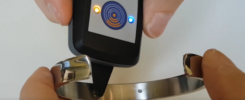It is increasingly clear, when we talk about the business of the future, the importance that IoT is reaching.
A research, carried out by Gartner, underlines the key role that IoT has reached during this year. Infact, only in 2017, the connected objects were about 8.7 billions.
Moreover, a further important data to be recorded is the exponential growth of interest in the IoT. The increase is 44% in 5 years, if we take into consideration the underlying graph of the growth in interest from 2012 to today the increase is clear to our eyes.

Below are the predictions for the future of the IoT for 2018:
- IoT will drive Digital Tranformation
Digital transformation is a process in continuous evolution that involves many different aspects of everyday business life, and one of the main drivers of it, is the IoT. Companies that have already adopted the IoT consider it as the core on which to base their business. These companies can be defined as the pioneers of digital transformation. According to Vodafone’s 2017/2018 Barometer, about 74% of the companies that have adopted IoT agree that the digital transformation can not take place without the Internet of Things.Also according to some industry research, the companies that have implemented IoT, or will do it shortly, will have advantages over competitors. Advantages above all in terms of: risk reduction, cost cutting, increase in customer satisfaction, thanks to the creation of an ad hoc solution, improvement of employee productivity and much more. - LPWAN will contribute to the implementation of IoT market
LPWAN (low power wide area networks) are making innovations in the connectivity field. One of these connections in Nb-IoT, the radio technology designed for the IoT, and focused specifically on indoor coverage, low cost, long battery life, and enabling a large number of connected devices.These LPWAN will allow the IoT market to open up to applications that previously could not benefit from existing connectivity. - Increase the use of IoT platform
IoT platforms enable companies to create new business models. Increasingly complex IoT solutions require more advanced communication platforms and middleware that facilitate seamless integration of devices, networks and applications. There is a wide range of software platforms developed to support and enable IoT solutions. The intention is to enable rapid development and reduce costs by offering standardized components that can be shared across multiple solutions in many vertical industries. As mentioned above, there is a wide range of IoT platforms, to name a few: connectivity management platforms facilitate the delivery of data communication services on mobile networks and other communication networks and device management platforms enable remote management of IoT devices.
- Increase IoT security
The IoT, as mentioned above, is a sector in continuous growth, so companies are becoming aware of the importance of the security factor which will allow a further boost to the implementation of new IoT technologies.
We, as TERTIUM technology, will take into account these new trends, continuing to improve our existing systems and services, trying to keep up with the digital transformation

